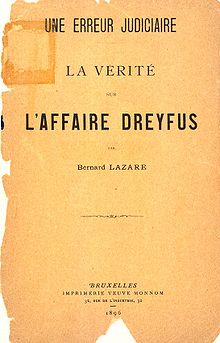Bernard Lazare
Bernard Lazare (born June 15, 1865 in Nîmes as Lazare Marcus Manassé Bernard , † September 1, 1903 in Paris ) was a French journalist , literary critic and anarchist of Jewish descent . He became known in connection with the Dreyfus affair .
Life
Bernard Lazare was born in Nîmes and chose to swap his first and last name as a pseudonym.
He was the eldest of the four sons of Jonas Bernard, a merchant of women's clothing, and of Douce Noémie Rouget, a traditional Provencal woman. The middle-class Rouget family introduced the jacquard handicraft in Toulouse and started one of the first successful factories for textiles with draperies and trimmings.
The Bernard family were followers of traditional Jewish traditions. Lazard Bernard graduated from high school in science, but his passion was literature. He shared this with his friend Éphraïm Mikhaël from Toulouse. The two posed as cousins. It was Éphraïm Mikhaël who, a year after enrolling at the archivist school in Paris, convinced Bernard Lazare to come to Paris.
Lazare came in 1886 to Paris, the year of the appearance of the title La France Juive (German Edition: The Judaised France ) by Édouard Drumont . Lazare enrolled at the École pratique des hautes études . There he chose the seminary of the clergyman Louis Duchesne , for whom the Institut Catholique de Paris set up a chair for church history .
It was there that Lazard's harshness, his fondness for factual details, and his urge to question what was asserted were evident.
Duchesne's book History of the Old Church ( Histoire de l'église ancienne ) was placed on the index . His writing style is "historical" and not "theological". During the university year 1887-1888 Lazare wrote a scientific paper "la législation conciliaire relative aux Juifs" (council legislation on the Jews).
In 1888, together with Éphraïm Mikhaël, he wrote the work La Fiancée de Corinthe , a dramatic story in three acts, in which his pseudonym appears for the first time. Two years later, Éphraim Mikhaël died of tuberculosis . This tragically marked the end of Lazare's youth. It was also the time he turned to anarchism, though he never really approved of direct action . But he always supported the ideas and their companions by funding their publications and paths. As an anarchist, he is responsible for a number of news items that resulted in some subpoenas. He wrote as an anarchist literary critic and published the painful revolt of the workers and artisans of Carmaux in the conservative, nationalist newspaper L'Écho de Paris . With his journalistic spirit of revolt he took part in the Congrès Socialiste de Londres ( Congress of Socialists ) in 1896 and denounced the “ authoritarian and jealous Karl Marx , who was unfaithful to his own program , whose goals diverged from an international one. "
In the Dreyfus affair , Bernard Lazare was convinced of the innocence of Captain Alfred Dreyfus and wrote “Une Erreur Judiciaire: La Vérité sur l'Affaire Dreyfus” (A miscarriage of justice: The truth about the Dreyfus affair) in 1896. After experience Following the anti-Semitic campaigns in France, Lazare changed his stance on the assimilation of Jews and supported the idea of anarchist Zionism without a state as a self-governing Jewish area.
Fonts (selection)
- L'antisémitisme son histoire et ses causes (1894 - Léon Chailley Ed.): Antisemitism: Its History and Causes. 1894. (online)
- Le nationalisme juif. 1898. (online)
- Antisemitism and revolution. 1898. (online)
- L'affaire Dreyfus - Une ereur judiciaire. Edition établie par Ph. Oriol, - Ed. Allia, 1993.
- Le fumier de job. Texts établi par Ph. Oriol - Ed. Honoré Champion, 1998. (English translation 1948: Harry Lotin Binsse)
- Juifs and antisemites. Edition établie par Ph. Oriol - Ed. Allia, 1992.
literature
- Hannah Arendt : Preface ( untitled ) and note to Bernard Lazare: Job's Dungheap. Essays on Jewish Nationalism and Social Revolution Schocken, New York 1948. (again in: dies .: Reflections on Literature and Culture. SUP Stanford, Calif. 2007, ISBN 978-0-8047-4499-7 , § 19, p. 143 –147)
- Hannah Arendt: Bernard Lazare. The conscious pariah . In: The Hidden Tradition. Eight essays. Suhrkamp TB, Frankfurt 1976, ISBN 3-518-06803-2 , pp. 55-58. (New edition Jüdischer Verlag, Frankfurt 2000, ISBN 3-633-54163-2 )
- Philippe Oriol: Bibliographie de BL Verlag Le Fourneau, 1994, ISBN 2-86288-399-9 .
- Robert S. Wistrich : Revolutionary Jews from Marx to Trotsky . Harrap, London 1976, ISBN 0-245-52785-0 , pp. 133-152.
Web links
- Bernard Lazare in the Jewish Encyclopedia
- The BL district in Grenoble and Paris (both in French)
Individual evidence
- ↑ Sebastian Voigt : Required reactions. Moritz Lazarus' reply to Heinrich von Treitschke's “Our Prospects” (1879) and Bernard Lazare's examination of Edouard Drumont's “La France Juive” (1886) . In: Mareike König, Oliver Schulz (Ed.): Anti-Semitism in the 19th century from an international perspective . 1st edition. V&R Unipress, Göttingen / Bristol (CT) 2019, ISBN 978-3-8471-0977-8 , pp. 335-354 .
- ↑ Mina Graur: Zionism. In: Lexicon of Anarchy. Retrieved August 1, 2911.
| personal data | |
|---|---|
| SURNAME | Lazare, Bernard |
| BRIEF DESCRIPTION | French journalist |
| DATE OF BIRTH | June 15, 1865 |
| PLACE OF BIRTH | Nîmes |
| DATE OF DEATH | September 1, 1903 |
| Place of death | Paris |

